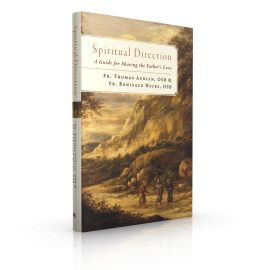By Fr. Boniface Hicks, OSB
Fr. Boniface Hicks, OSB, is a Benedictine monk of St. Vincent Archabbey in Latrobe, Pennsylvania. He has provided spiritual direction for many men and women, including married couples, seminarians, consecrated religious, and priests. He is the co-author, with Fr. Thomas Acklin, OSB, of Spiritual Direction: A Guide for Sharing the Father’s Love.

"You don't have to wait to be old or lifeless to practice the virtue of chastity. Purity comes from love; and the strength and gaiety of youth is no obstacle for noble love. Joseph had a young heart and a young body when he married Mary, when he learned of the mystery of her divine motherhood, when he lived in her company, respecting the integrity God wished to give the world as one more sign that he had come to share the life of his creatures. Anyone who cannot understand a love like that knows very little of true love and is a complete stranger to the Christian meaning of chastity." —St. Josemaria Escrivá, Homily on St. Joseph
Like St. Joseph, the priest is called to be a “noble lover.” For St. Joseph, continence for the kingdom (Matt 19:10-12) was not so much a great disappointment or a painful sacrifice as it was a supreme gift that brought him into the most intimate contact with God Incarnate and His All-Beautiful Mother. We know that St. Joseph was a dreamer (Matt 1:20; 2:13,19), but we can only speculate what St. Joseph’s dreams were for his life. We can only guess at how he might have envisioned having a family and how he envisioned his life with Mary. No matter what St. Joseph’s dreams may have been, however, we can be certain they all fell short of the actual dream he was called to be a part of. St. Joseph never guessed what God would say to him in his dreams and how those dreams would unfold in his life. A man who fully lives the supernatural grace of priestly celibacy inevitably discovers the same thing for himself.
In an article on formation for seminarians, From Fantasy to Contemplation, Deacon James Keating writes, “There is only one reason God calls a man to celibacy: he wants his full attention in order to satisfy the cleric’s need for love. . . . The mysticism of celibacy proclaims that only when one is totally bound to God’s generous love can he, in turn, donate himself with a universal love ‘of the many’ (Matt 26:28).” Like St. Joseph, the priest is in daily contact with the Incarnate Word in the Eucharist as well as with surpassing beauty in the contemplation and service of his mystical bride. St. Joseph could easily have been tempted to overlook these wonders he spent time with every day. His wife and her Son were the same each day and there is always the temptation to take the familiar for granted, even when it is divine. They were ordinary enough that the neighbors had no idea who they were (Luke 4:22) and surely that ordinariness made it easy for St. Joseph also to forget who they were as well.
The priest can learn from St. Joseph never to take the Eucharist for granted. St. Joseph was the first to discover the secret of God’s inner life. He learned that to be divine is to be infinitely vulnerable. The fragile existence of the Incarnate Word would have been snuffed out in Mary’s womb if she had been stoned to death. St. Joseph sacrificed his comfort, his plans, and his reputation to protect her and her Son. The Incarnate Word could have died of exposure or starved to death after birth if St. Joseph had not provided for Him and His Mother. St. Joseph provided shelter and food, but most importantly he provided them with much love. God entrusted His most tender vulnerability to St. Joseph. God continues to entrust His Eucharistic Heart in the greatest vulnerability into the hands of the priest. How easily the Eucharist can be stolen, blasphemed, defiled, or neglected. How easily the priest can simply go through the motions and take this great gift for granted. But we can learn from St. Joseph to be sensitive, careful, reverent and loving towards our God who makes Himself infinitely vulnerable out of love for us.
Lastly, we can learn from St. Joseph how to contemplate beauty. St. Joseph spent his married life in the presence of the Tota Pulchra, the All-Beautiful Holy Mother of God. Whatever he sacrificed in having his own biological children or experiencing physical marital intimacy, he received back a hundredfold in the gift of Mary. He was able to gaze into her eyes, savor her voice, and enjoy her eloquent and delicate gestures. He was consoled by her loving touch, her feminine sensitivity, and her insightful intuition. He was also able to care for her, be strong for her, protect her, and even save her. He could console her tears, provide for her needs, and dream with her about their future and the future of the world. He could pray with her and simply rest in her presence. These are gifts from God for the priest as well, who can learn to do all this in prayer with Mary, but also enjoys analogous experiences in his relationships with the members of the Church, his virginal Bride. Like St. Joseph, he must learn to shake off familiarity and continually renew his vision of faith. Then she comes into focus. How beautiful she is!
You Might Also Like

The need for spiritual direction—or the accompaniment of a spiritual guide—is becoming more prominent in a world where so many are suffering from so many wounds. With a harmonious integration of both timeless spiritual wisdom from the Catholic Church’s tradition of prayer and direction, and the insight of the psychological sciences, Fathers Thomas Acklin and Boniface Hicks offer a comprehensive guide for all who provide or seek spiritual direction. Spiritual Direction: A Guide for Sharing the Father’s Love fortifies priests, religious, and lay faithful who embrace the ministry of spiritual direction and accompany the wounded, assist men and women in hearing the voice of God, and model the love and mercy of the Father for the many who are seeking Him but do not know Him or have false images of Him.